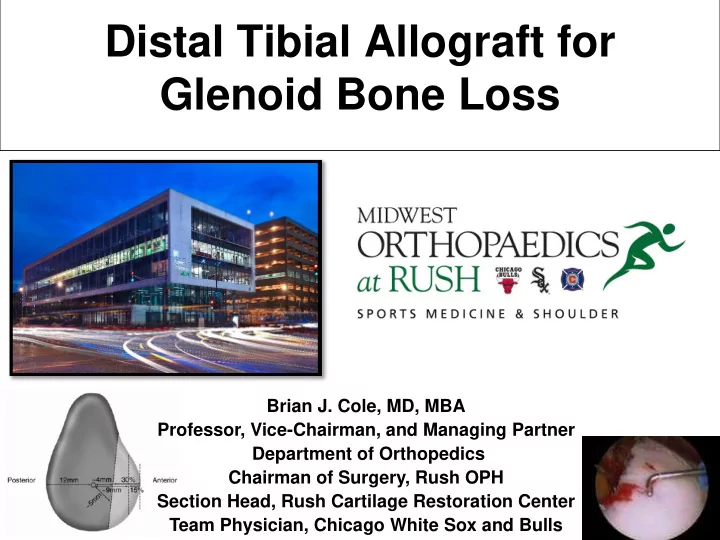

Distal Tibial Allograft for Glenoid Bone Loss Brian J. Cole, MD, MBA Professor, Vice-Chairman, and Managing Partner Department of Orthopedics Chairman of Surgery, Rush OPH Section Head, Rush Cartilage Restoration Center Team Physician, Chicago White Sox and Bulls
I (and/or my co-authors) have something to disclose. Detailed disclosure information is available via: Printed Final Agenda Meeting App Meeting Website www.aana.org/annual or AAOS Orthopaedic Disclosure Program on the AAOS website at http://www.aaos.org/disclosure
Arthroscopy 2000 67% recurrence in patients with bone defect Shorter glenoid “safe arc” less resistance dislocation
How Does it Happen? Bone Loss Potentiates Bone Loss Acute Attritional
More Instability = More Bone Loss Am J Sp Med 2004 • Bipolar Lesions: • 44.2% - 1-5 inst. events • 69.0% - 6-10 inst. events 82.8% - ≥11 inst. events • • Primary vs Recurrent: • 33.3% of shoulders with primary instability • 61.8% of shoulders with recurrent instability
JAAOS 2009 Arthroscopic Arthroscopic…caution! Open Incorporate Fragment Coracoid Incorporate Fragment Age, Sport, Frequency ICBG Posteroinferior anchor Remplissage…if HS Distal Tibia Remplissage?
JAAOS 2009 Arthroscopic…caution! Arthroscopic Incorporate Fragment Incorporate Fragment Age, Sport, Frequency Posteroinferior anchor Remplissage…if HS Remplissage? Open Coracoid ICBG Distal Tibia
What “should” happen…
Problems with Latarjet • 25-30% Complication Rate • Infection, Instability, Neurologic, Nonunion, Re-operation JBJS Br 1995 Radiologic DJD in 10 patients (71%)
Distal Tibia Allograft Arthroscopy 2009 Availability Restores Anatomy Osteochondral Biologic advantage Biomechanical support
Building Blocks of Evidence Latarjet vs Articular Contact ICBG Pressures
JBJS 2010 Latarjet graft placed flush Iliac crest placed 2mm proud Varied placement and orientation of iliac crest and Latarjet autograft Flush placement 2mm proud or recessed FLUSH graft placement optimized GH contact pressure
Building Blocks of Evidence DTA vs Latarjet Articular Contact Pressures Latarjet vs Articular Contact ICBG Pressures
AJSM 2014 Distal tibial Latarjet osteochondral Reconstruction 30% defect allograft Intact Glenoid DTA Improved GH CONTACT AREA compared to a Latarjet DTA with lower JOINT PEAK FORCES in ABER compared to the Latarjet
Building Blocks of Evidence Articular Contact DTA vs ICBG Pressures DTA vs Latarjet Articular Contact Pressures Latarjet vs Articular Contact ICBG Pressures
AJSM 2016 ICBG DTA DTA improved GH CONTACT AREA compared to a ICBG
Building Blocks of Evidence Clinical Outcomes DTA vs Latarjet Articular Contact DTA vs ICGB Pressures DTA vs Latarjet Articular Contact Pressures Latarjet vs Articular Contact ICBG Pressures
Arthroscopy 2017 Indications: >15% Bone Loss CT at F/U 27 patients at mean 45 months Improved: ASES, SANE, WOSI CT at 1.4 year: 89% healing better with lesser angles
Outcomes Of Latarjet versus Distal Tibia Allograft for Anterior Shoulder Instability Repair: A Prospective Matched Cohort Analysis Frank RM, Kim J, O’Donnell P, Golijanin P, Verma N, Cole BJ, Bnicholson GP, Romeo AA, Provencher MT Indications: >15% Bone Loss DTA (30) vs Latarjet (30) at min 2 yr (mean, 4 yrs) Matched: Age, BMI, # prior surgery Improved: ASES, SANE, WOSI Laterjet higher ASES (93 vs 87) Similar re-operation (1 DTA and 2 Latarjet) Longer-Term F/U to determine if DJD and Recurrence Differ
Conclusions Remplissage really used for a different patient in the U.S. Coracoid associated with excellent L-T results but some morbidity (nerve) and potential for DJD Distal Tibial Allograft another option without donor site morbidity May be best for large volume glenoid bone loss and revision scenarios Translational support May reduce incidence of DJD
THANK YOU First Annual AANA/AOSSM/AAOS SKI COURSE January 31-February 3, 2018 Park City, Utah www.BrianColeMD.com
Recommend
More recommend